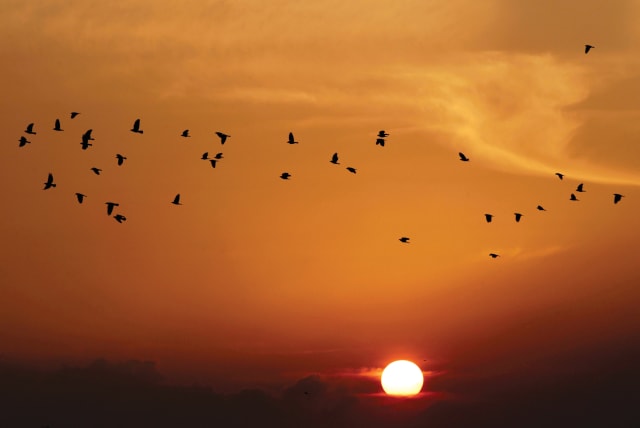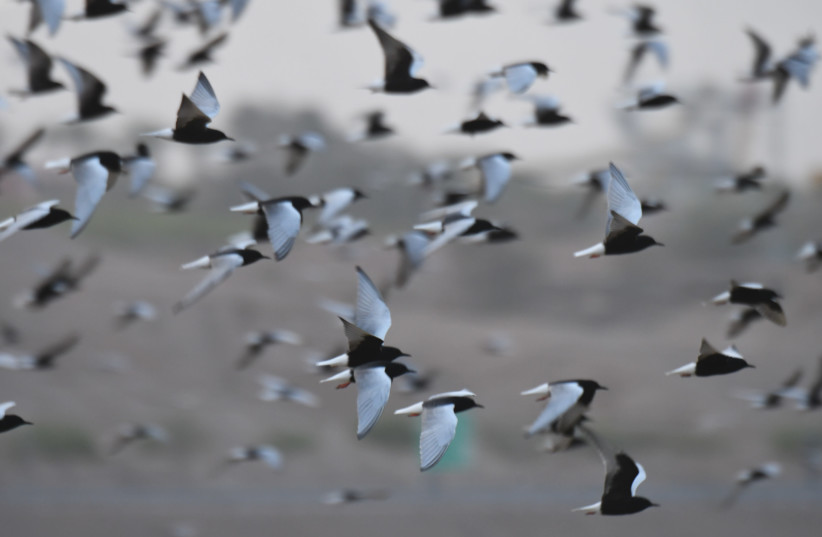Why I started feeding birds in Jerusalem

For me, feeding God’s creatures is like a song of praise to the Creator, and they repay me with birdsong.
My morning rendezvous with the birds on the balcony of my Jerusalem home began many years ago, when I first met my son-in-law’s mother, a Holocaust survivor. At the time, bread was highly subsidized in Israel, very inexpensive, and many people threw it out when it became a day old. She told me how a crust of bread often meant the difference between life and death in the Auschwitz concentration camp; so In Israel, she would ask her neighbors to give her what they didn’t want. What she couldn’t transform into breadcrumbs, she would take down the street to a place near her home in Yavne, a small development town, where there were donkeys, and she’d feed the bread to them.
There are no donkeys in the neighborhood of Beit Hakerem where I live, but I never forgot her words and since then could never throw away a piece of bread. So I decided to feed the birds, putting out the crusts and stale slices every morning on my back balcony where I grow my herbs. For most of the year, when it’s sunny, that’s where I eat breakfast, and now the birds come and breakfast with me every day. At 6 a.m., there are one or two sitting in the branches of a tree below the balcony. They know me now – they twitter a few notes, and soon there are ten or more different birds coming magically from surrounding trees, waiting to partake of their breakfast. For me, feeding God’s creatures is like a song of praise to the Creator, and they repay me with birdsong.
The many birds that visit Israel
I have read that there are 470 species of birds that visit Israel through the seasons. Very few regions in the world can boast of so great a variety within such a small geographical area. The reason for this wealth of bird life is that we are situated at the meeting point of three continents – Europe, Asia and Africa. Israel is also located along one of migration routes of Eurasian birds, forming almost the only land bridge between the Mediterranean and the Arabian deserts. Birds visit on their way south to Africa in the autumn and back north again to Europe and Asia in the spring.
I don’t think many of my birds are visitors because they come back every day, no matter what the weather, so they must mostly be resident birds. The little brown birds that send a message to the others as they watch for me to open the door to my balcony every morning are wrens.
Each one takes a tiny portion – sometimes just a few crumbs – and either eats it on the ledge or flies back with a piece in its mouth to a nest hidden in some nearby tree. Then come a few sparrows, which seem to congregate in flocks and like each other’s company while they dine. If I’m lucky, a lark will come and sing me a song of gratitude after his breakfast. The turtledoves came for the summer. I loved to hear their deep-throated cooing. Last year, they made a nest on the ledge outside my study. They laid three eggs. The mother sat on them, and her mate brought her food regularly in his beak (as a good husband should). I watched every day for the eggs to hatch, and finally they did. I didn’t open my study window all summer for fear of frightening them away, but they soon learned to fly and were gone. I am hoping they will remember and come to nest again.
Near the bread, I also put out a container of water, and many of the birds appreciate this – either to drink, or they land right in it and have a bath.
The most unusual bird that has come to visit so far, I identified through a picture in a book as a Red-throated Pipit. It is about 15 cms. long, with a wingspan of 27 cms. The throat is russet brown, and so is the breast. I found out that it comes from northern Scandinavia, and it turned up one winter morning. Then it disappeared for a few months and came back in the spring. I don’t know if it was the same one, but I like to think it was, that it had enjoyed my hospitality and remembered my balcony.
It is very therapeutic to make a special place in your home where you can enjoy nature, whether it be bird life, flowers, herbs or trees. No matter how elegant or comfortable the interior, make a spot on a balcony where you can overlook a garden or trees if you don’t have your own. There you will find beauty and stillness, free from noise and distractions. It is very calming to take time to meditate, watch a sunset or in autumn see the leaves turning gold. And remember the lovely Chinese proverb: “Keep a green tree in your heart, and perhaps the singing bird will come.” ■
The writer is the author of 14 books. Her latest novel is Searching for Sarah. Her own favorite novel, Esther – a Jerusalem Love Story, has been republished in Israel by Chaim Mazo and is also available on Amazon.
Jerusalem Post Store
`; document.getElementById("linkPremium").innerHTML = cont; var divWithLink = document.getElementById("premium-link"); if (divWithLink !== null && divWithLink !== 'undefined') { divWithLink.style.border = "solid 1px #cb0f3e"; divWithLink.style.textAlign = "center"; divWithLink.style.marginBottom = "15px"; divWithLink.style.marginTop = "15px"; divWithLink.style.width = "100%"; divWithLink.style.backgroundColor = "#122952"; divWithLink.style.color = "#ffffff"; divWithLink.style.lineHeight = "1.5"; } } (function (v, i) { });

